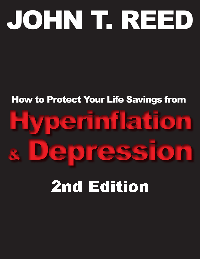JP Morgan Chase ban on keeping non-collectible cash in a safe deposit box
Posted by John T. Reed on
Copyright 2015 by John T. Reed
On 4/1/15, Chase sent a letter to U.S. customers saying they “agree not to store cash or coins other than those found to have a collectible value.”

Executive Order 6102
Where does that come from? Executive Order 6102 issued by FDR in 1933 ordered U.S. residents to sell all their bullion gold to the U.S. Federal Reserve by May 1, 1933 for $20.67, the fixed exchange rate since 1792. In 1933, $20.67 was less than market value by a few dollars.
Bullion gold means gold that sells for its weight in gold, and no more. Collectibles like rare coins, sell for MORE than their face value or weight in the metal in question.
So the Chase policy, had it been in effect in 1933, would have, if adhered to by the deposit box renter, prevented the use of Chase boxes to evade the law with regard to gold coins—which were in normal circulation prior to the issuance of Executive Order 6102.
The Chase policy also prevents the possession of foreign currency in such boxes. I have recommended putting certain foreign currencies in cash into a Canadian safe deposit box, namely, Swiss francs (CHF) and Danish (DKK) and Swedish krone (SEK). The reason is those currencies recently have had deflation and/or made it difficult to impossible for Americans to get bank accounts in those countries. Those currencies seem less likely to hyperinflate than the USD.
The email I got telling me about this Chase policy is from Doug Casey’s International Man. They say the motive is to enable the U.S. government to confiscate the money after you move it from cash to a bank account.
Cash is suspicious
That is possible. I think the more likely motive is cash in safe deposit boxes among those who are not my readers suggests illegal activity. Lately, the U.S. government has been behaving in a very heavy-handed way with regard to any transactions or categories of businesses that they do not like, e.g., check cashing, pawn shops, and so on. This new Chase policy is just that—a Chase policy—not a U.S. government policy—yet.
In Depression, millions lost bank accounts; no one lost safe deposit box contents
Another concern is that millions of people who had bank accounts lost them during 9,000 U.S. bank failures during the Great Depression. In some cases, smart depositors had moved their money from accounts to safe deposit boxes in the exact same bank! The contents of the bank accounts were lost when the bank failed, but safe deposit box renters were able to get 100% of their box contents after the failure.
Keep your gold in Canada
I oppose gold ownership. http://www.johntreed.com/golddisadvantages2.html But if you must, I strongly urge you to hold it in a safe deposit box in Canada, NOT in the U.S. This Chase policy is another reason to follow that advice.
Chase scares
There was a previous scare about Chase on the Net. I checked that one out and found it was a bunch of bull. Chase had just changed the pricing of various business accounts and limited withdrawals per month in the cheaper one. Net bloggers said Chase was limiting withdrawals. They were not on accounts for big businesses or consumers, just on a cheap small business account, which no one was forced to have.
Put your rainy-day savings abroad
To protect yourself from hyperinflation, you should have your rainy-day savings either in foreign bank accounts in foreign currencies in the foreign country in question, or the above mentioned foreign cash in a safe deposit box in Canada. The currencies I recommend for that purpose are AUD, CAD, CHF, NZD, DKK, and SEK.
Share this post
0 comment
